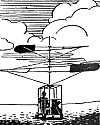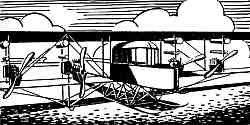|
After reading everything available, he realized he had to do more - he would have to learn first hand about engines and airplanes - he would have to practice, work and practice. So in January 1909, with the financial aid of his sister, he went to Paris where they were experimenting with airplanes. He spent months at the flying fields talking to the experts, particularly Captain Ferber who offered him the following advice: "Don't waste your time on the helicopter - the airplane will be far more valuable." Another expert published an article on the helicopter entitled "The Wrong Way."  But young
Sikorsky returned to Kiev with a lot
of information, an engine, and a firm determination to build one. In
the next two months he built an experimental machine, then the tests
and real troubles began. The helicopter frame resembled a large
rectangular box - the engine was on one side, the operator on the
other. Many detail troubles were encountered and fixed, then the real
difficulty showed up - the engine was too small. So he made a second
design. A year later the new machine was completed - it would lift
itself but not the operator - there were still many problems to be
solved. But young
Sikorsky returned to Kiev with a lot
of information, an engine, and a firm determination to build one. In
the next two months he built an experimental machine, then the tests
and real troubles began. The helicopter frame resembled a large
rectangular box - the engine was on one side, the operator on the
other. Many detail troubles were encountered and fixed, then the real
difficulty showed up - the engine was too small. So he made a second
design. A year later the new machine was completed - it would lift
itself but not the operator - there were still many problems to be
solved. In the meantime, he also designed and built an airplane. This was ready
for test in April, 1910, and although he had never flown a plane
before, without hesitation he climbed into the pilot's seat and opened
throttle. But he could get into the air only a few feet. Again it was a
question of power. He was getting both practice and experience.
In the meantime, he also designed and built an airplane. This was ready
for test in April, 1910, and although he had never flown a plane
before, without hesitation he climbed into the pilot's seat and opened
throttle. But he could get into the air only a few feet. Again it was a
question of power. He was getting both practice and experience. |








